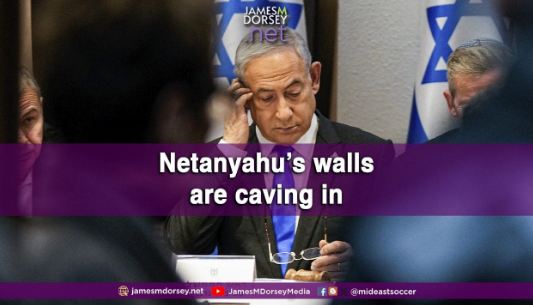Netanyahu’s multiple battles fall into two categories: keeping his increasingly fragile government in place and fighting a war he has already lost in the court of public opinion and possibly on the ground in Gaza if measured by the prime minister’s war goals.
On Monday, Israel suffered its most significant international setback since 2016 with the US allowing the United Nations Security Council to call for an immediate ceasefire in Gaza.
The United States abstained in a 2016 Council vote that condemned Israeli settlement activity
The US Gaza vote strains Israel’s relations with the United States, its main backer that prevented the Security Council from demanding a ceasefire for the past six months, as well as Europe, and most of the rest of the international community.
US Ambassador Linda Thomas-Greenfield abstained during a vote at the United Nations in New York on a resolution calling for an immediate cease-fire in Gaza. Credit: ANGELA WEISS/AGENCE FRANCE-PRESSE/GETTY IMAGES
“The bilateral relation (with the US) suffered a serious blow,” said former Israeli foreign ministry director general Alon Liel. He said the same is true for Europe with European Security Council members voting in favour of a ceasefire.
“There should be no doubt: the US is signalling Bibi that his house is on fire, and he should not take the US for granted,” added Martin Indyk, a former US ambassador to Israel and US Middle East peace negotiator. Mr. Indyk was referring to Mr. Netanyahu by his nickname.
US ambassador Linda Thomas-Greenfield controversially attempted to soften the blow by declaring the resolution “non-binding,” even though UN Security Council resolutions are legally binding and constitute international law.
In doing so, Ms. Thomas-Greenfield was also trying to create a buffer against likely pressure on the United States to sanction Israel if it refuses to abide by the resolution.
The State Department said hours before the UN vote that the United States deemed Israel in compliance with President Joe Biden’s national security memorandum requiring recipients of US weapons to guarantee that they adhere to international humanitarian law and will not block the provision of humanitarian assistance.
“We’ve had ongoing assessments of Israel’s compliance with international humanitarian law. We have not found them to be in violation, either when it comes to the conduct of the war or the provision of humanitarian assistance,” State Department spokesman Matthew Miller said.
That did not stop Mr. Netanyahu from responding to the US abstention in the UN vote by cancelling a visit to Washington by an Israeli delegation headed by Strategic Affairs Minister Ron Dermer, who lacks a military background, to discuss Israel’s planned ground offensive in Rafah, the southern Gazan city that is home to more than a million Palestinians displaced by the war.
With Defence Minister Yoav Gallant already meeting with senior US officials in Washington in a separate visit, Mr. Netanyahu’s defiance is largely symbolic.
Israeli Defense Minister Yoav Gallant. Credit: REUTERS/Fabrizio Bensch/File
Nevertheless, Mr. Gallant, responding to the UN vote, warned that Israel “will act against Hamas everywhere, even in areas where we have not been yet.”
Mr. Gallant stopped short of naming potential target countries, but Qatar, the main ceasefire and prisoner exchange mediator, and Turkey are likely to top the list.
Israel has accused Qatar, home to several exiled Hamas leaders, of funding Hamas, although the US and Israel acquiesced in their presence in the Gulf state to maintain a back channel with the group.
Mr. Netanyahu for years solicited Qatari funding in a bid to prevent a breakdown of law and order in Gaza and keep the Palestinian polity, split between Hamas and Palestinian President Mahmoud Abbas’s Palestine Authority, divided.
The Middle East Media Research Institute (MEMRI), founded by Yigal Carmon, a former advisor to Israel’s West Bank and Gaza occupation authority and Prime Ministers Yitzhak Shamir and Yitzhak Rabin, has produced in recent months a series of reports designed to bolster Israeli denunciations of Qatar.
This week, MEMRI took Qatar to task for hosting the Doha-based, Muslim Brotherhood-affiliated International Union of Muslim Scholars (IUMS).
Palestinian and Jordanian members of the Union have called on their compatriots to join the fight against Israel and “the Jews” with protests and uprisings against autocratic rulers who allegedly enable Israel’s war, a reference to Arab countries that have diplomatic relations with Israel. The clerics also urged Arab militaries to come to the support of their Palestinian brethren.
Meanwhile, US Assistant Secretary of State William Russo warned in a readout of a phone call with Israeli foreign ministry officials earlier this month that “the Israelis seemed oblivious to the fact that they are facing major, possibly generational damage to their reputation not just in the region but elsewhere in the world. We are concerned that the Israelis are missing the forest for the trees and are making a major strategic error in writing off their reputation damage.”
Assistant Secretary of State for Global Public Affairs William Russo Credit: Jason Armond / Los Angeles Times
Add to this the fact that the evolution of the war in recent weeks and running battles with Palestinian fighters in the West Bank suggests that even if the fighting ends today, Israel is looking at an insurgency in Gaza and the West Bank for the foreseeable future unless the ceasefire is linked to a credible effort to resolve the Israeli-Palestinian conflict.
The US intelligence community last month predicted that “Israel probably will face lingering armed resistance from Hamas for years to come, and the military will struggle to neutralize Hamas’s underground infrastructure, which allows insurgents to hide, regain strength, and surprise Israeli forces.”
In Gaza, the Israeli military increasingly is fighting in places it initially occupied and then withdrew from in the belief that it had defeated Hamas.
Battles in recent days in and around Nasser Hospital in Khan Younis and Al-Shifa Hospital in Gaza City erupted in areas Israel earlier said had been cleared of Palestinian fighters.
In addition, Hamas, hours before the UN vote, launched, for the first time in two months, rockets at the Israeli port city of Ashdod.
Israel’s seeming inability six months into the war to defeat Hamas, despite dealing it severe body blows, is compounded by its incapability or unwillingness to maintain law and order in Gaza, its effort to undermine for political rather than security reasons the United Nations Relief and Welfare Agency (UNRWA), the predominant humanitarian organisation in the Strip, and its refusal to allow unfettered humanitarian supplies to enter the territory.
The United Nations Relief and Works Agency (UNRWA) building in Rafah, the southern Gaza Strip. Credit: Abed Rahim Khatib/Flash90
The power vacuum created by Israeli military tactics and policy reinforces Hamas’ resilience and its ability to return to areas vacated by Israeli forces.
Taken together, the UN setback and the evolution of the war contradict Mr. Netanyahu’s assertions that Israel is achieving its war goals, including destroying Hamas, freeing more than 100 remaining hostages kidnapped by the group in its October 7 attack on Israel, and ensuring that Gaza no longer serves as a launching pad for Palestinian resistance.
Mr. Netanyahu will have been heartened by the insistence, in response to the UN resolution, of Mr. Gallant and Benny Gantz, a member of the war cabinet, that Israel will continue the war until its goals have been realised.
War Cabinet member Benny Gantz. Credit: Ronen Zvulun/Reuters
Nevertheless, the UN resolution weakens Israel’s negotiating position in talks mediated by Qatar, the United States, and Egypt to secure a ceasefire and an exchange of the hostages for Palestinians held in Israeli prisons.
The resolution, in effect, constitutes an attempt to force negotiating parties to reach agreement in the next two weeks by demanding an immediate ceasefire for the Muslim holy month of Ramadan that would end on April 10, but lead “to a lasting sustainable ceasefire.”
While most Security Council members will read the resolution’s demand for “the immediate and unconditional release of all hostages” as a reference to the Hamas-held hostages, it allows Hamas and others to interpret the clause as also including Palestinians in Israeli prisons.
The claim would be substantiated by the ongoing ceasefire negotiations and Israel’s past willingness to exchange prisoners.
Israeli officials said before the UN vote that Mr. Netanyahu had accepted a US compromise proposal to raise the number of Palestinian prisoners that Israel would free in exchange for hostages. Media reports said Hamas had rejected the US proposal.
Qatari foreign ministry spokesman Majed al-Ansari insisted at his weekly news conference that negotiations were ongoing. “We have been carrying ideas and thoughts from both sides,” Mr. Al-Ansari said. The spokesman said he hoped to have more details in the next week.
Israeli media reported at about the time Mr. Al-Ansari that Israel had recalled its negotiating delegation in Qatar. A statement issued by the prime minister’s office made no mention of the withdrawal but accused Hamas of “retreating to its ‘extreme’ demands.
The statement said, “Israel will not cave to Hamas’s delusional demands.” It asserted that the breakdown in talks “attests to the damage done by the UN Security Council’s resolution.”
Mr. Netanyahu is under pressure from weekly mass protests in Israel demanding his resignation and the government’s prioritization of the release of the hostages, even if that involves an end to the war.
Speaking to Al Jazeera, Hamas political bureau member Bassem Naim welcomed the UN call for a ceasefire but insisted that “what we are negotiating is not about hostages. We are negotiating about a total ceasefire and total Israeli withdrawal from the Gaza Strip.”
Basem Naim in his office in Gaza City. Credit: Heidi Levine / star
Mr Naim went on to say, ”It is not just about hostages. We have 7,000 Palestinians in Israeli prisons, which we consider hostages. If we talk about hostages, it has to be hostages from both sides.”
In a statement, Hamas said it was ready “to engage in immediate prisoner swaps on both sides.”
The ceasefire negotiations, leaving aside the hostage issue, create another powder keg that could blow Mr. Netanyahu’s coalition apart with Hamas demanding the return of displaced Palestinians to their homes in northern Gaza. Israel reportedly said it would agree to the return of 2,000 Palestinians a day.
Mr. Netanyahu’s ultra-conservative and ultra-nationalist partners want Israel to retain control of the area for security reasons as well as to populate it with Israeli settlements.
Israel has created a depopulated strip void of buildings along Gaza’s northern border that would serve as a post-war security zone. It has also built a road that would divide the north of Gaza from the south.
As is if all this were not enough, Mr. Netanyahu’s UN setback came as domestic tensions were pushing his government to the edge of a cliff.
Although unrelated, opposition politician Gideon Saar, who, together with Mr. Gantz, joined Mr. Netanyahu’s emerging unity government formed after Hamas’ October 7 attack resigned because the prime minister had refused to include him in the war cabinet.
Gideon Saar speaks during a press conference in Tel Aviv on March 25, 2024. Credit: Avshalom Sassoni/ Flash90
Mr. Saar’s departure does not deprive the government of its majority in the Knesset, the Israeli parliament, but Mr, Netanyahu’s domestic woes don’t stop there.
Mr. Gantz threatened on Sunday to leave the government if the Knesset passed a bill in a vote scheduled for next Monday that would exempt ultra-orthodox Jews from military service. Mr. Gallant also voiced opposition to the bill that Mr. Netanyahu is still tinkering with in a bid to prevent his government from falling apart.
Israel’s Supreme Court has demanded the government lift the exemption of the ultra-Orthodox as a matter of equality in conscription.
Ultra-Orthodox men of military age have for decades avoided the draft by enrolling in yeshivas, or religious seminaries. The Israeli military said 66,000 young ultra-Orthodox men had been exempted from military service in the past year.
“Gallant isn’t that bothered by the ultra-Orthodox dodging the draft. But with the government failing to set clear objectives for the Gaza war, his only alternative is to try to engineer the coalition’s downfall,” said prominent Israeli journalist Anshel Pfeffer.
“Gallant seems to have reached the unavoidable conclusion that with the current governing coalition, not only will there be no equality of service, but more immediately, the war cannot be prosecuted. Benjamin Netanyahu’s incessant efforts to provoke a crisis in Israel’s relationship with the United States, his cynical use of the Rafah operation that the IDF (the Israel Defence Force) is in no rush to embark on, and his refusal to even discuss a realistic ‘day after’ plan for Gaza are all preventing the IDF from planning the next months of the war,” Mr. Pfeffer said.
Mr. Gantz’s threat potentially puts Mr. Netanyahu between a rock and a hard place.
Ultra-Orthodox politicians, including United Torah Judaism leader and Housing Minister Yitzhak Goldknopf, warned that if even “one real yeshiva student has to close his Talmud, there will be no government.” The Talmud is a primary source of Jewish law and theology.
Housing Minister Yitzhak Goldknopf attends a United Torah Judaism faction meeting at the Knesset on July 10, 2023. Credit: Chaim Goldberg/Flash90
However, the two men said they may accept the enlistment of ultra-Orthodox young men who are not religious scholars.
Dr. James M. Dorsey is an Adjunct Senior Fellow at Nanyang Technological University’s S. Rajaratnam School of International Studies, and the author of the syndicated column and podcast, The Turbulent World with James M. Dorsey.

















